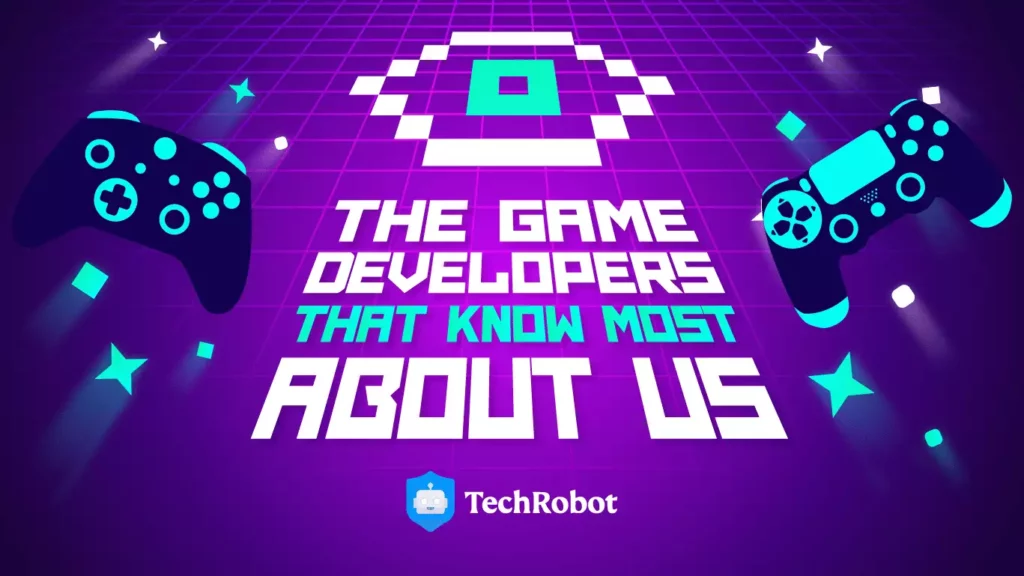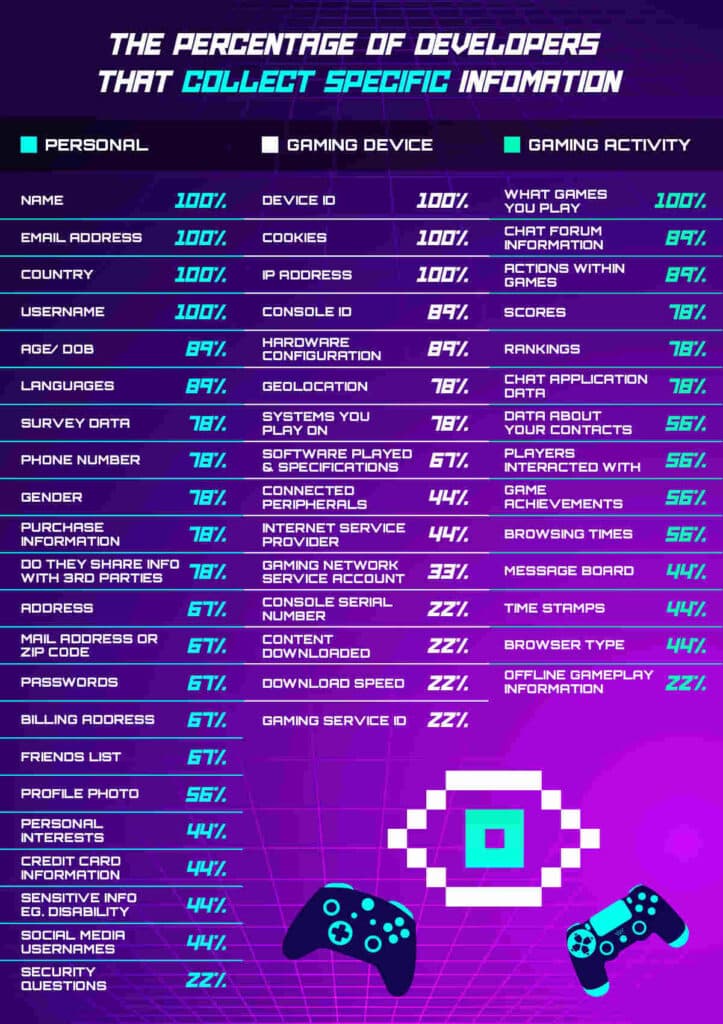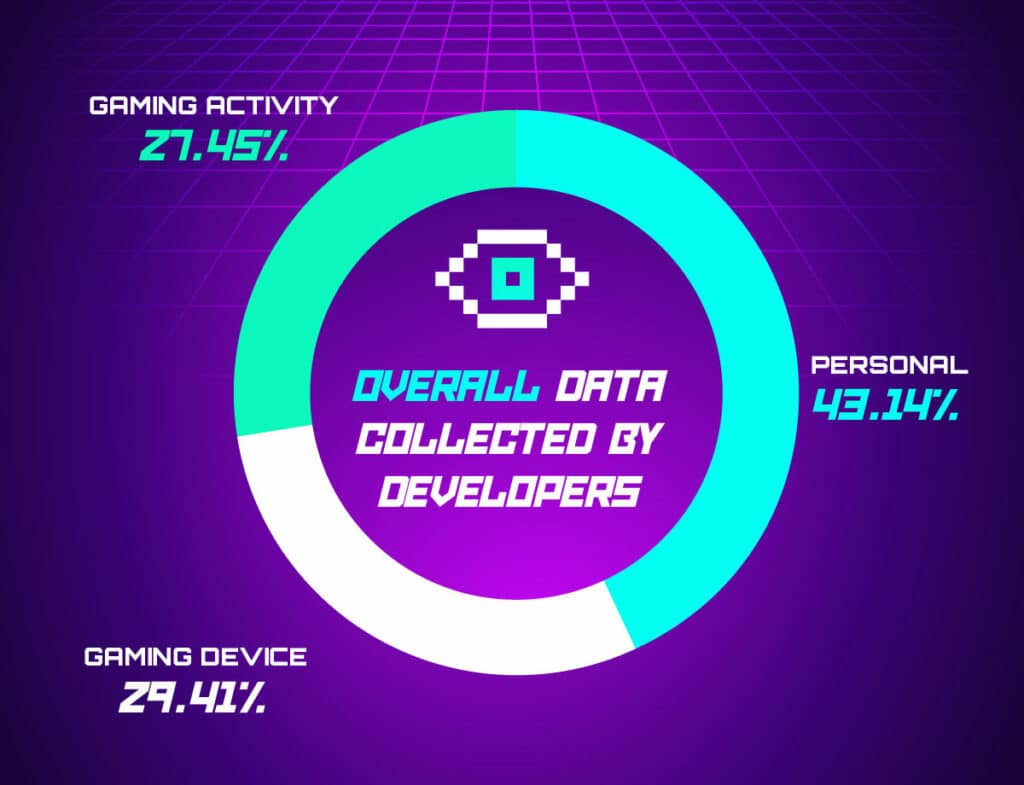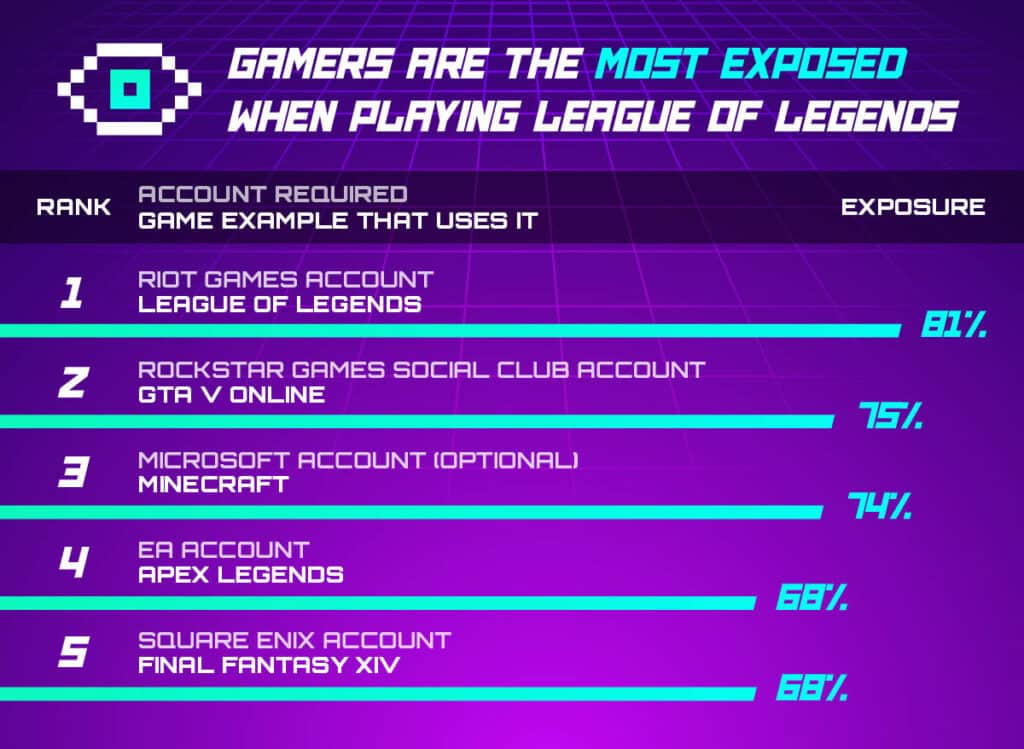How Much Do Game Developers Know About You?

The number of people who play video games is increasing at an incredible rate, and there are no signs that this growth will slow down anytime soon. The latest industry data from Statista reveals that there are currently over 3 billion gamers, and this is expected to rise year on year.
The more the gaming industry matures, the more opportunities there are for game developers to harvest user data. It’s now common practice for video game developers to collect and store certain information about users’ online gaming activity, whether to shape the gaming experience for future releases or to make advertisements more targeted to their interests.
Part of staying safe online is getting clued up on the information collected about you, what it’s being used for, and whether it’s being shared with any third parties.
TechRobot has dived into the privacy policies of the most popular game developers to reveal what and how much information they know about online gamers who register for accounts and play with them.

What Game Developers Know About You
The following table shows the top five data points (out of 47) commonly collected by the most prominent online game developers on gamers who sign up for accounts.
| Category | Data collection points | Percentage of developers that collect data on this metric |
| Personal data | Name | 100% |
| Personal data | Email address | 100% |
| Personal data | Country | 100% |
| Personal data | Username | 100% |
| Gaming activity data | Which games you play | 100% |
All the popular online game developers analysed gather standard personal information about their users such as name, email address and country. Almost 90% also collect players’ dates of birth and languages used.

While if compromised this information could put users at risk of identity theft, generally the collection of this data is low risk. It is also necessary for developers to store this information for account security purposes and to ensure users’ gaming preferences and activities are linked to their accounts.
However, other commonly collected data points do flag privacy concerns. In particular, information on our in-game activity which could give developers and third parties that they share information with an unsettling level of insight into our personal lives.
How Online Gaming Could Put Your Conversations & Private Content At Risk
Not only do over half (56%) of online game developers gather data on registered gamers’ contacts and who they play with, but nearly 90% accumulate information on in-game conversations. If you have registered your information with an online game developer and it is hacked, your private conversations including any images or videos you send could be leaked. Once shared online, if it spreads, this type of information is difficult to have removed. Moreover, if cyber criminals were able to emulate your conversations they could carry out very convincing identity theft.
The table below shows the percentage of developers that collect data on chat forum information, data about your contacts and who you play with.
| Category | Data collection points | Percentage of developers that collect data on this metric |
| Gaming activity data | Chat forum information | 89% |
| Gaming activity data | Data about your contacts and who you play with | 56% |
Regardless of a situation where your data is compromised, collecting information on your conversations also gives online game developers – and the third parties they share information with – an uncomfortable and potentially damaging insight into your personal life. If you were to have conversations in-game, that a developer or third party deemed illicit or illegal at the very least you could be banned from playing their games at the worst this information could be passed onto legal authorities and result in criminal charges.
To protect yourself when playing online games, bear in mind the content of your conversations with other gamers is being monitored and think before sharing sensitive or compromising information.
How Your In-Game Activity Could Be Used Against You In Your Everyday Life
Nearly 90% of online game developers track registered gamers’ actions when they are playing, 78% store data on individual players’ scores and rankings and 56% follow game achievements, including how long it takes to complete tasks. Generally, this information is used to improve user experience and ensure games remain engaging and complex. However, when you consider what this information indicates about your personality and intelligence and that 78% of developers share it with third parties, questions arise about how this data could be used outside of a game environment.
The table below shows the percentage of developers that collect gaming activity data indicative of a user’s intelligence and personal choices.
| Category | Data collection points | Percentage of developers that collect data on this metric |
| Gaming activity data | Actions within games | 89% |
| Gaming activity data | Scores | 78% |
| Gaming activity data | Rankings | 78% |
| Gaming activity data | Game achievements | 56% |
| Gaming activity data | Offline gameplay information | 22% |
If a government body, prospective employer or educator were to analyse your in-game choices and successes as a reflection or prediction of your offline ability and actions this could impact your life significantly. For example, if a user displays anti-authority tendencies or a propensity to violence this could mark them as an unsuitable employee.

As far-fetched as this sounds, it’s not an unrealistic prospect. The Chinese government has introduced a social credit system which examines multiple data points, including gaming, to rank how trustworthy citizens are and limit their activity in line with this. For example, by freezing their assets or preventing them from boarding flights.
Understandably some online gamers may feel vulnerable and concerned about the privacy risks if game developers pass in-game activity information to certain third parties. If you are concerned about how your information is being shared by game developers, you may be able to limit this by adjusting your settings or contacting the developer directly. Microsoft, for example, gives users the right to decline to share personal data and control how their data is used.

The Most Invasive Game Developers
By reviewing the privacy policies of the top game developers, and the user account services they run, we have revealed which collect the most information from gamers who have registered accounts with them.
The table below outlines the top three online game developers that collect the most data about registered players, based on the percentage of information they store across the following data categories: personal data, gaming activity data and gaming device data.
| Rank | Developer / Account needed | Percentage of data points collected per developer |
| 1 | Riot Account (League of Legends, Valorant) | 81% |
| 2 | Rockstar Games Account (GTA Online, Red Dead Redemption 2) | 75% |
| 3 | Microsoft Account (Minecraft) | 74% |

Riot Games Knows the Most About You
Members registered for a Riot account have the highest percentage of their data collected by any developer. Riot, the developer behind the massively popular League of Legends, Valorant, and other well-known games, collects 81% of potential personal data, gaming activity data and gaming device data points.
The only data that Riot doesn’t collect about users is information on their connected peripherals, security questions, the content they have downloaded, and information on their time zones and employment.
The level of information Riot does gather gives the developer an incredibly in-depth insight into its registered players, their personal preferences and their personal lives. This is concerning in light of the fact that Riot shares this data with third parties. However, the gaming developer assures its users that all data they collect helps them to operate more efficiently and provide a better service for players. They also state that any data shared with third parties is either to improve their services (for example through using tools like Google Analytics) or due to legal obligations such as a request from law enforcement. So as long as you are not a criminal, generally your information will only be used to improve your online gaming experience.
If you are worried about Riot sharing your data, you can view their Cookies & Related Technologies information to learn which third parties they collaborate with, and how to opt out of sharing information with these partners.
Rockstar Games Knows Your Location
Rockstar Games collects slightly less data from their account users than Riot, gathering 75% of the data points analysed. Games released by Rockstar include GTA Online (GTA V), which is the second highest trending online game in the world, and Red Dead Redemption 2, which has sold 44 million units worldwide as of May 2022.

These millions of players may be unaware that the gaming developer collects so much information about them when they register to play. The data Rockstar gathers includes personal data that allows the developer to know players’ exact location at all times – such as their address and phone number, IP address and geolocation. Rockstar also collects information on registered users’ offline gameplay meaning they have a constant insight into what gamers are doing on their gaming devices.
Rockstar admits to sharing registered user data with third parties, which could lead players to worry about where exactly their information ends up. However, similarly to Riot Games, Rockstar reassures users that all of the information they gather is to improve their service and provide the best possible gaming experience. For example, data such as user ID and gameplay statistics are needed when participating in online gaming sessions. The game developer also states that they only share information with third parties to improve user experience, for example by providing relevant advertising, or for legal or safety reasons.
If you still have concerns about how your data is being used, you can visit Rockstar’s Privacy Policy page to learn exactly how they process and share your details, as well as how you can exercise your right to object to their use of your personal information.
Microsoft Knows What You Talk About When Playing

Microsoft follows very closely behind Rockstar, collecting 74% of possible data points. This means that although Microsoft accounts are optional for players of popular games like Minecraft, gamers who do choose to register an account will find that 74% of the data points we analysed are collected.
Like Riot and Rockstar, Microsoft shares information with third parties, including data about your contacts and who you play with, credit card information, chat application data, and more.
Tracking your chat application data lets Microsoft know what you talk about with other players while gaming. If this data was compromised by hackers or shared by the developer, very personal information could be exposed. For example, any private photographs that you share could be leaked, and any potentially compromising information sent in private messages may be passed on to authorities. This could land you in some serious legal trouble if the messages implicate you in any illicit activities, as they can be used against you as evidence.
Microsoft states in their Privacy Policy that users have the right to decline to share personal data, although this may then mean that you aren’t able to access certain features. If you do wish to opt-out and protect your data, you can visit the Microsoft Privacy Dashboard or contact them for further guidance.
How Your Gaming Console Impacts What Developers Know About You
Gamers should be aware that the data developers collect varies depending on the device they are using to play the game. For example, those playing games via a PC will often have to download additional software, such as Riot Vanguard- an anti-cheat software which is needed to play Valorant on PCs. The data collected about PC gamers may therefore differ and be more complex. For example, Riot’s Vanguard software has unprecedented access to a user’s computer’s hardware and runs even when they aren’t playing the game giving the developer constant access to potentially sensitive information. To ensure they are comfortable with the information collected on them, PC gamers should read online game developers’ full privacy policies before installing software required to play certain games.
Gamers Are The Most Exposed When Playing League of Legends
Based on the information being collected by the top five game account providers and developers, we’ve established the games that players are the most vulnerable when playing due to the volume of data that they collect and store about users.
| Rank | Developer / Account needed | Example Game that uses this account | Percentage data points stored per game |
| 1 | Riot Account | League of Legends | 81% |
| 2 | Rockstar Games Social Club Account | GTA Online (GTA V) | 75% |
| 3 | Microsoft Account | Minecraft | 74% |
| 4 | EA Account | APEX Legends | 68% |
| 5 | Square Enix Account | Final Fantasy XIV | 68% |
Popular games such as League of Legends, played by millions of players around the world, are more likely to be targeted by cybercriminals. This game collects information on users’ basic personal data, such as name and contact information, but also on their contacts, gameplay activity and even their internet service provider. Whilst this information may seem extensive, big game titles such as this rely on this level of information collection to run effectively. Players should therefore make themselves aware of the risks associated with playing bigger games and what could happen if their data was illegally obtained by hackers.

If you would feel more comfortable playing a game that stores less of your information when you register for an account and play, Final Fantasy XIV may be one to consider. The developer of Final Fantasy XIV, Square Enix, collects just 68% of all the data points we analysed and the majority of this is on gameplay.
How to Protect Your Data When Playing Games Online
Game developers collect a large volume of information on their players to improve their overall playing experience. For example, analysing gameplay data like in-game achievements can help developers understand if they’ve made a game too easy or complex. In turn, elements can be adjusted for future releases, so that they remain fun and interesting for gamers.
According to PC gamer, “Metrics are vital to modern game development. Most mainstream PC games quietly collect them, and while it can feel disconcerting to know that your PC is feeding information about how you play to a server somewhere, it’s a big part of the reason games can change and improve over time.”
But while this data collection may be essential for developers to provide an optimal gaming experience, it’s also important to be aware that the more data game developers hold on their players, the more data that can be stolen by hackers.
In 2022, a hacker breached the database of a popular browser-based virtual pet game called Neopets, and allegedly stole the personal data of up to 69 million users. This information included the names, postcodes, and email addresses of users, which the hacker offered to sell for the equivalent of £75,500 in Bitcoin.
Someone who buys stolen data could use it for a variety of purposes. Since many game developers collect credit card or payment information, a criminal who obtains this data could use these details to fraudulently apply for loans, or make online purchases in the gamers’ name.
If you still want to make use of the variety of games that are available to play online but are concerned about the amount of personal data put at risk if you sign up for a gaming account, our VPN expert Lasse Walstad recommends the following:
Install a VPN
Through your IP address hackers can work out your geographical location, gain access to your online activity and personal data. Using a VPN can encrypt your internet connection and hide your IP address and will ensure that all of your devices connected to it are protected.
However, bear in mind that some developers will ban players who use a VPN due to a range of factors, such as getting around location-locked release dates which breach their terms. Many gamers have used VPNs in the past to get around region-locked release dates, but it’s important to remember that certain developers and games may have terms and conditions regarding these criteria. Moreover, using a VPN is only suitable for single-player and PC games as otherwise, it could slow down the gaming experience. If your console prohibits VPN use but you still want to use one, the best way to connect is via an Ethernet cable.
Check out our lists of the best VPNs for Discord, Fortnite, and Playstation 5.
Reduce the amount of data you put online
The easiest way to reduce your online vulnerability is to limit the amount of personal information you are putting online. This will ensure that you know all the information that is available about you to others.
Pick a strong password for your gaming account
Picking a strong password that’s different from the ones you use for other accounts like your online banking or social media accounts will make it harder for hackers to compromise your personal information.
Sources and methodology
Based on the top 100 Twitch streamed games for August 2022 we identified the top nine online game developers in the world. From this list of developers, we determined the gaming accounts that users are required to have to play their games.
We then analysed all publicly available documents relating to gaming account holder data collection by each developer, such as privacy and developer policies. Based on this we calculated the number of data points each developer collects to reveal which knows the most about its registered users. This also enabled us to determine the most commonly collected data points by gaming developers, and the impact that this has on gamers’ privacy.
The data points we looked at were across the following categories: personal data, gaming device data and gaming activity data.
- statista.com/statistics/1284941/rdr2-unit-sales-worldwide-total/
- riotgames.com/en/privacy-notice
- abc.net.au/news/2018-03-31/chinas-social-credit-system-punishes-untrustworthy-citizens/9596204
- account.microsoft.com/account/privacy
- statista.com/statistics/748044/number-video-gamers-world/
- twitchtracker.com/games
- privacy.microsoft.com/en-gb/privacystatement
- rockstargames.com/privacy
- riotgames.com/en/privacy-notice
- ea.com/legal/privacy-and-cookie-policy?isLocalized=true&setLocale=en-gb
- epicgames.com/site/en-US/privacypolicy
- square-enix-games.com/en_GB/documents/privacy
- emea.battlegrounds.pubg.com/en/pp-website/
- blizzard.com/en-gb/legal
- activision.com/uk/en/legal/privacy-policy
Related Posts
- The Best VPN Services (Updated: 2024)
- The Best No Lag VPN for Faster Servers & Lower Latency in 2024
- Find the Best VPN for Bluestacks
- Find the Best Meta Quest 2 VPN
- Get The Most Out Of Roblox With A VPN
- The Risks of Finding Love Online
- Find the Best VPN for Xbox Series X
- Indonesia Blocks PayPal and Gaming Services Over New Licensing Rules
- Best VPNs for Discord – Using a VPN for VOIP in Gaming
- 5 Best VPNs for Fortnite